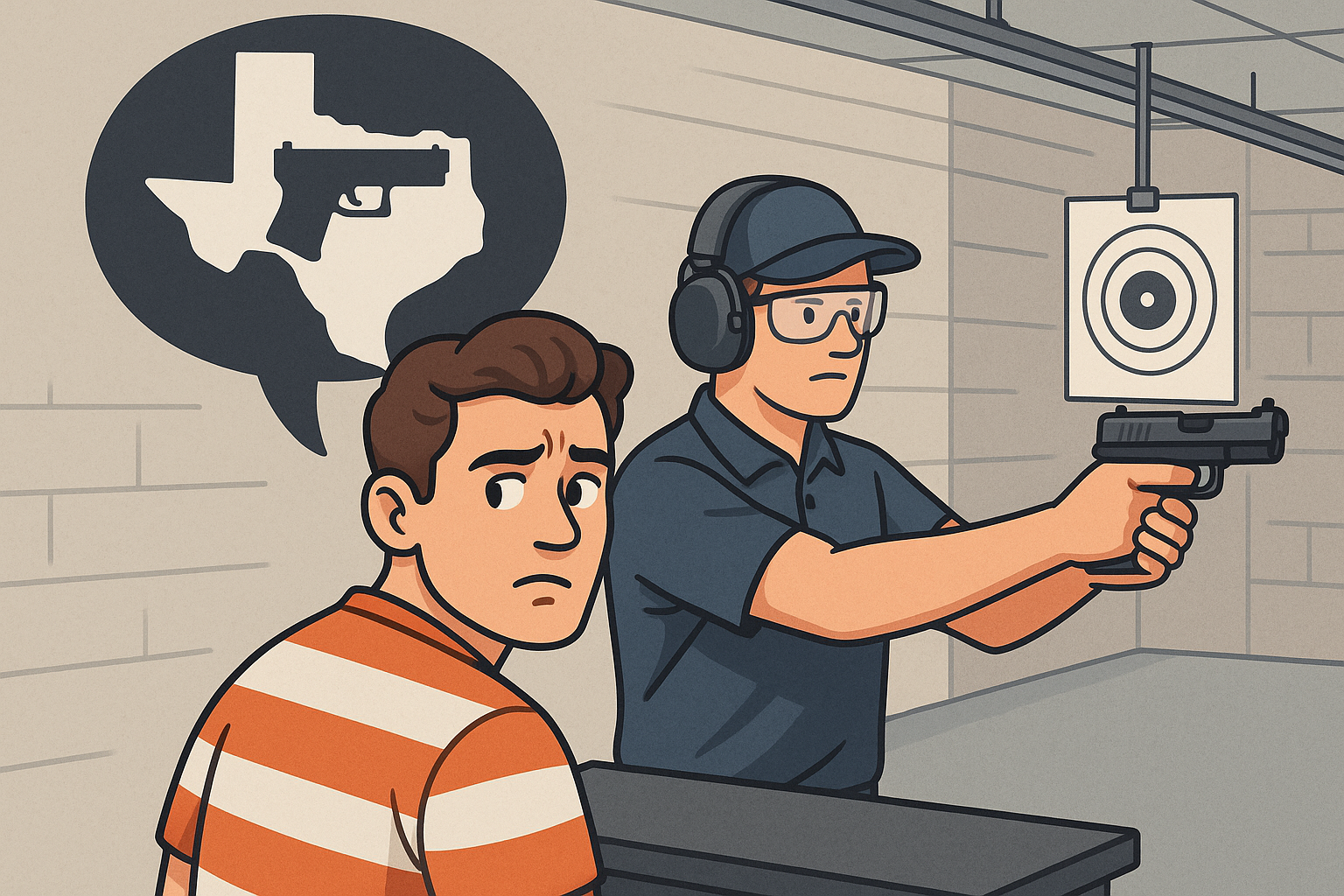Guns are part of the cultural DNA of Texas. From generations of sport shooters and hunters to proud Second Amendment supporters, there’s hardly a town or ranch in Texas that hasn’t heard the crack of a shotgun or the pop of a .22.
But when it comes to firearm laws—especially those involving convicted felons—Texas isn’t the Wild West. The laws are stiff, often misunderstood, and the consequences can be life-altering. Today, we’re answering a question that teeters on the edge of legality and public curiosity:
Can felons go to the gun range in Texas?
The answer isn’t a simple “yes” or “no.” It’s layered in federal statutes, state-specific provisions, legal gray zones like ‘constructive possession,’ and the complexities of rights restoration. From a legal standpoint—and speaking as someone who has spent years reporting from courtrooms, interviewing criminal defense attorneys, and digging into Texas firearm legislation—let’s break this issue down with precision, clarity, and the gritty reality that felons and their loved ones face every day.
What Texas Law Says About Felons and Firearms
Before you step foot near a shooting range as a felon in Texas, it’s essential to understand where both Texas state law and federal law stand. They don’t always align—and that dissonance can land people in hot water.
🚫 Texas Penal Code § 46.04: Unlawful Possession of a Firearm
Under Texas law, a person who has been convicted of a felony is prohibited from possessing a firearm:
- At any time before the fifth anniversary of their release from confinement, parole, or community supervision (whichever is latest).
- After that, the convicted felon may only possess a firearm at the premises where they live.
That’s it. No shooting ranges. No hunting trips. No exceptions written into Texas state law for handling or firing firearms at commercial gun ranges after that 5-year period. And that’s where many people get confused.
Because “possessing” a firearm at home after five years and “using” one at a commercial shooting range are not the same.
This leads us to the second hammer that can fall on a felon’s aspirations to fire a gun again:
The Federal Law (18 U.S.C. § 922(g)): The Bigger Barrier
Federal law is even more unforgiving than Texas law when it comes to felons and firearms.
According to Title 18 of the United States Code, Section 922(g)(1):
It shall be unlawful for any person—who has been convicted of a crime punishable by imprisonment for a term exceeding one year—to possess any firearm or ammunition.
And ‘possess’ doesn’t just mean owning the gun. Federal courts interpret this very strictly to include:
- Holding a firearm, even for seconds.
- Firing a rental gun at a shooting range.
- Being in the same car, locker, or backpack as a firearm (so-called constructive possession).
Violation of this statute is a federal crime, punishable by up to 10 years in federal prison.
In short: while Texas might allow limited possession after five years—and only inside the felon’s home—federal law continues to ban all firearm possession or use by felons unless their rights have been legally restored.
Can a Felon Visit a Gun Range Without Breaking the Law?
Let’s answer this bluntly.
No. A felon can’t legally shoot a firearm at a gun range in Texas—indoor, outdoor, private, or public—unless their gun rights have been formally restored by the proper court system or through a federal pardon.
Why?
- Shooting at a range = handling and firing firearms = possession.
- Felon + firearm possession = federal offense, no matter how brief the contact.
Even if the firearm belongs to someone else—even if it’s a rental house gun provided by the range—that changes nothing under the law. There is no “I’m just using it for sport” defense in federal court. Intent is irrelevant. Possession is possession.
Constructive Possession: A Legal Trap
Let’s raise the stakes even higher.
Even if a felon merely rides along with someone who owns firearms en route to a range—or stands next to them while they shoot—they could be facing what’s known as constructive possession.
Under federal law, constructive possession occurs when:
- A person has access to, control of, or the ability to direct the use of a firearm—even if they never physically hold it.
A few real-world scenarios:
| Scenario | Risk of Violation |
|---|---|
| Felon goes to range, holds a gun | Illegal possession |
| Felon goes to range, doesn’t touch gun | Risky due to proximity—constructive possession |
| Felon stores gun in home owned by someone else | Illegal unless rights restored |
| Felon lives with gun owner | Risky—must ensure no access or control over guns |
What Happens If a Felon Is Caught With a Gun in Texas?
Here’s what the fallout can look like—based on actual case outcomes and attorney commentary.
State Charges
If a felon is found in possession of a firearm before the five-year post-sentence waiting period (or outside their own residence after that period):
- They can be charged under Texas Penal Code § 46.04, which is generally a third-degree felony punishable by:
- 2 to 10 years in prison
- Up to $10,000 in fines
- Additional probation or parole restrictions
Federal Charges
Regardless of the five-year state law rule, violating U.S. Code § 922(g) triggers federal involvement:
- Up to 10 years in federal prison (mandatory minimums possible in some cases)
- Federal probation/parole revocation
- Career criminal enhancements if prior convictions are involved
Prosecutors often pursue federal charges when the case involves:
- Repeat offenders
- Public safety risks
- Use of firearms in furtherance of crimes
Can Felons Be Around Guns in Texas?
This deserves its own exploration, because it’s a question that shows up in courtrooms, online forums, and client-attorney meetings every day.
A felon can legally be near firearms only if:
- They aren’t in actual or constructive possession.
- They don’t have access, control, or the ability to use the weapon.
- The guns are legally owned and stored (locked, inaccessible, not shared).
- The living arrangement includes strict firearm separation measures.
That means, a felon:
- Should not live in a home where guns are easily accessible.
- Should not ride in vehicles where guns are stored.
- Should not hold or handle guns—even under supervision.
- Should not go hunting with others carrying firearms—even if they’re only observing.
How Felons Can Restore Gun Rights in Texas
Here’s the light at the end of the tunnel—but it’s a long, procedural road. In Texas, there are only a few legitimate ways a felony record holder can regain the legal ability to possess or use firearms.
1. Full Pardon
- Granted by the Texas Board of Pardons and Paroles and the Governor
- Restores civil rights lost due to conviction (including gun rights)
- Rare and requires:
- A waiting period after sentence completion (generally 10+ years)
- Clean criminal record post-conviction
- Proof of rehabilitation and community engagement
📝 Tip: A ‘forgiveness’ pardon may not fully restore gun rights under federal law. The pardon must explicitly state the restoration of firearm rights to be recognized federally.
2. Federal Relief from Disabilities (18 U.S.C. § 925(c))
This used to be an option through ATF, but due to Congress defunding the review of such applications, this path is currently defunct. There’s technically a process—it just hasn’t been funded or operational for decades.
3. Expunction or Set-Aside (Extremely Limited)
- True felony convictions generally cannot be expunged under Texas law.
- Deferred adjudication may provide a possible route if no conviction entered.
Your best bet? Speak with a Texas criminal defense attorney experienced in post-conviction relief and firearm law. Every little detail in your case history (e.g., the kind of felony, whether it was violent or non-violent, whether it was deferred) can change your options.
Can a Non-Felon Take a Felon to the Gun Range in Texas?
From a social perspective? Yes. From a legal perspective? 🚨Danger zone.
Having a non-felon take a convicted felon to a shooting range may:
- Trigger constructive possession allegations.
- Bring the felon within proximity to numerous firearms.
- Implicate both the felon and the gun owner if federal law is broken.
Take this seriously: both parties can face legal scrutiny. Not just the felon.
Even standing behind the firing line watching, a felon at a public or private range is potentially building a case against themselves that a federal prosecutor can run with.
Gun Range Rules for Convicted Felons
Most reputable gun ranges in Texas—indoor and outdoor—explicitly forbid felons from shooting or even entering unless their rights have been restored. Many will require you to sign a waiver or declaration that you’re not prohibited from using firearms under federal law.
Lying on these forms = another felony.
Some ranges conduct background checks if firearms are rented; others rely on self-certification. Either way, they’re not the gatekeepers. Federal law doesn’t care if the range let you shoot. If you’re a felon and you fire a gun, you’re the one committing a crime.
Final Word: Should Felons Risk Going to the Gun Range in Texas?
Here’s the honest, expert answer: Absolutely not—unless your gun rights have been formally, legally restored at both the state and federal levels.
No hobby, no ‘fun day at the range,’ and no Facebook photo is worth 10 years in a federal detention facility. Texas prosecutors—and federal agents—don’t show mercy when it comes to felons and firearms.
Whether you’re a felon yourself or someone who loves one, take this hard truth to heart: Respecting the law can save your freedom. Challenging it improperly can destroy it.
Key Takeaways: Gun Laws for Felons at Texas Gun Ranges
- ✔️ Texas law allows limited possession at home 5 years after sentence, but not use at ranges
- ❌ Federal law bans all firearm possession by felons unless restored
- ⚠️ Going to a gun range = handling firearms = illegal possession
- 🚔 Caught? You could face 10 years in federal prison
- 📜 Only way to regain rights: pardon, relief, or expunction (rare)
FAQ: Felons and Shooting Ranges in Texas
Q: Can a felon shoot a gun at a private range in Texas?
A: No. Federal law prohibits possession, regardless of whether the range is public or private.
Q: What if the felon is using a rental gun provided by the range?
A: Still illegal. Possession is the key factor, not ownership.
Q: Can a felony be expunged to restore gun rights?
A: True felony convictions usually can’t be expunged in Texas. Deferred adjudication may provide options.
Q: Can a felon fire a black powder rifle at a range?
A: Sometimes. Black powder firearms are not federally classified as firearms, but state law may still apply. Consult an attorney.
Q: Are there any loopholes for non-violent felonies?
A: No. The federal law applies to all felonies punishable by more than one year, regardless of violence.
✍️ This guide was written with the backing of years covering Texas courts, interviewing criminal defense attorneys, and monitoring real-world case law. The risks are real. The consequences severe. If you’re unsure about your eligibility or post-conviction rights—we recommend starting with a qualified Texas firearm attorney and staying far away from gun ranges until you know, without question, that you’re in the clear.
Let safety, legality, and honesty guide you. Always.

